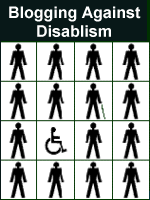Eliot Renard is a genderqueer, feminist, socialist Chicagoan who enjoys making math and science accessible and fun for students through various online tutoring programs. Ze also has a health blog, personal blog and tumblr, because compartmentalizing is fun.
This is the second post of a short series; part one, “Rocky Beginnings,” can be read here.
There is a part of growing up that was never really addressed in my family: leaving home and starting your own family. When I met my spouse in college, I realized that I had no idea how to become a healthy, emancipated adult; I simply had no examples to work from. When you throw in the fact that my health began to decline shortly after I began to make earnest attempts at emancipation – and stopped backing down every time I received substantial pushback – the process has frankly been excruciating.
I keep many aspects of my personality secret from my family – as a genderqueer atheist Catholic*, I have decided it is just not worth the effort. I also imagine that the “I thought it was obvious!” defense would be plausible if I were outed, which assuages my guilt a bit. Unfortunately, it becomes difficult to hide the extent to which your illness is affecting your life when you are sleeping 15-20 hours per day, and have dropped out of grad school. Hence, the fact that I have not had a conversation that neither devolved into a frustrating, tear-filled shouting match, nor focused largely on the weather.
As discussed in part one of this series, I have addressed the content of my family’s objections to my “life choices” – because getting sick is obviously a life choice – extensively. Numerous emails, phone conversations and weekends in my hometown have been devoted to explaining exactly what was wrong with each hurtful, disrespectful thing my family says. These conversations usually end with my mother suggesting that if I can’t hold down a job, I should just move back home. Yes, screaming at me, denying my illness, and accusing my spouse of abuse are all meant to make me want to be around that behavior 24/7.
Pursuing a suggestion from my therapist, I have tried redirecting the conversations to the core issues at play – emancipation, healthy boundaries, and the fact that I am an adult. Given that similar discussions took place before this most recent series of health developments, many in regards to the fact that I went to college 200 miles away from home, got married, then moved to a city 500 miles from home, and that my mother has also dealt with issues concerning emancipation and healthy boundaries, I felt that these issues were worth discussing. I recently asked my mother whether she thought she had a right to know every detail about my life. Her response terrified me in a way few things have: “Well, you’re the one having trouble.” The thought that if I ever need help, I may have to trade my basic privacy scared me so much that my vision blacked out. I had never felt the loss of my family’s support as strongly as I did then.
When my attempt to create healthy boundaries is perceived as an abusive spouse separating me from my family, what actions can lead to a happy ending for all involved? I am afraid that, by insisting on what I perceive to be a normal, adult life, I am causing substantial pain to my family, who interpret these actions to be the results of abuse. They are afraid of losing me forever to a terrible situation, and cling more tightly. I am afraid of losing myself forever by staying. No one is happy here. No one is benefiting from this pain.
I don’t know what to do if this continues; I am worried about the effect that being in hopeless situations has on my suicidal and self-harm ideation, especially given that this very situation has triggered both. I have no control over anyone’s actions but my own, but the idea of distancing myself from my very tight-knit family is disheartening. Also unfortunate is the fact that if I don’t talk to my grandmother, Uncles A, B and C won’t talk to me, and Uncles D and E will spend any conversation time pressuring me to reinstate contact. I would also lose absolutely all contact with my brother, niece and nephew. Sadly, I know that if I chose to play family politics here, I would “win”. It just isn’t worth the slimy feeling afterwards.
I am working to build a support network outside of my mother’s family. I have a few very close friends from college and my neighborhood who have helped me tremendously. I was only at my graduate school for a few months, and was so consistently physically excluded from events that I gave up on forming connections there. The group of people that has consistently come through on helping me with whatever I needed is spread all over the world, and many of us have never met face-to-face; my friends from various online communities – activist groups, fandoms, friends-of-friends – have saved my life. Days when I cannot get on the computer (which lives on my bed, along with all of my medications and enough food to last a few days) are rare, and the communities there are amazing – and not always in the inspiring way. It is in this very community that I came to accept my right to feel angry and defeated at times. I don’t have to be a “super-cripple,” and that realization is what keeps me going through the bad days. I am hoping that this ability and time will lead to a healthy resolution with my family. If not, I already belong to a strong community here.
*Trust me, it works. You just have to stretch your definition of “cafeteria Catholicism” a tiny bit further…

